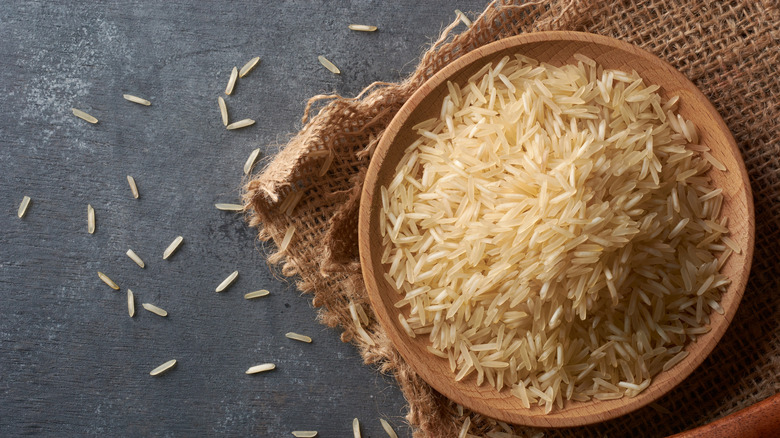The Brand Of Rice Ina Garten Always Has In Her Kitchen
Ina Garten has long been a darling of the food world thanks to "The Barefoot Contessa" show and her numerous cookbooks. Garten is known for simple dishes that are equal parts rich and rustic, so it's no wonder people love to see what she has in her pantry. It turns out her favorite kind of rice is RiceSelect Texmati rice for its delicious taste.
Not all brands of rice are the best, and sometimes the selection in a grocery store is overwhelming. That's why it's always nice to have recommendations from the Barefoot Contessa herself. Texmati is a cross between standard American long grain rice and basmati. It's known for being tender, light, and easy to grow within the United States — true basmati doesn't like the climate stateside. It has a nutty and sweet taste and lovely aroma that complements most any dish.
Texmati's parent variety, basmati rice, is originally from the foothills of the Himalayas, in what is now India and Pakistan. Perfect basmati rice is intensely fragrant, making it just as delicious as a side or the main event in dishes like biryani. It's what you'll get at most Indian and Pakistani restaurants in the U.S.
Understanding the Texmati controversy
Interestingly, the name Texmati is trademarked by RiceTec — the company behind the RiceSelect brand. It also holds a patent over the grain itself. Now, patenting foods is fairly non-controversial, but it gets a little more complicated when it comes to patenting the genes and seeds of certain crops.
RiceTec created the Texmati variety of rice, so it makes sense why they would want to patent it. However, the company attempted to patent various strains of rice (and the related growing processes and characteristics), referring to them as types of "basmati." Controversy arose because an American company was trying to own the name of a rice variety that has a long history in South Asia, and the Indian government argued that the supposedly unique qualities of RiceTec's rice were those that true basmati inherently possessed.
RiceTec did withdraw some of the initial patents it filed because the claims were too broad, but ultimately, the company did receive patents for three of the hybrid grains it created: Texmati, Jasmati, and Kasmati. The impact was that RiceTec effectively controls production of this basmati-type rice in the United States.
The good news is farmers, consumers, and other stakeholders around the world, including in the U.S., are actually working to acknowledge that Texmati and basmati come from South Asia. They are the result of thousands of years of indigenous knowledge and care. We should delight in the foods we can now share globally and pay due diligence to the storied history that comes with a grain as wonderful as rice.

